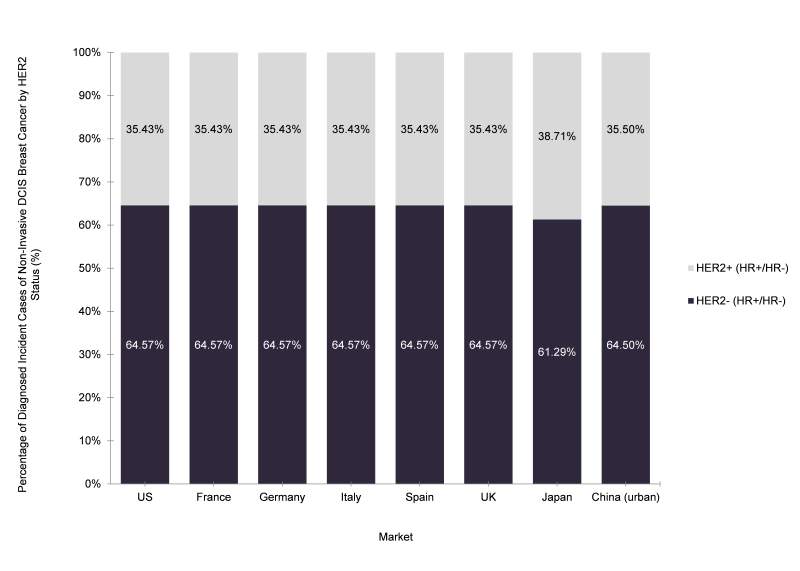
All newly diagnosed breast cancer patients are tested for human epidermal growth factor receptor 2 (HER2), a molecule that increases the uncontrolled growth of cancer cells.
Knowing a patient’s HER2 status is critical in battling non-invasive and invasive breast cancers because HER2-positive (HER2+) breast cancers are more likely to benefit from HER2-targeted therapy compared with HER2-negative (HER2-) breast cancers. Although there are treatments that specially target HER2+ breast cancer patients, breast cancers with high levels of HER2 have a poorer prognosis, are more likely to spread, and are less likely to respond to treatment.

Discover B2B Marketing That Performs
Combine business intelligence and editorial excellence to reach engaged professionals across 36 leading media platforms.
The most common type of non-invasive breast cancer is ductal carcinoma in situ (DCIS), where abnormal cells have been found but have not become malignant. In the eight major pharmaceutical markets (8MM) of the US, France, Germany, Italy, Spain, the UK, Japan, and urban China, GlobalData epidemiologists found that approximately one-third of non-invasive DCIS cases were HER2+, as opposed to only approximately one-fifth of invasive breast cancer cases (as shown in Figure 1 and Figure 2).
Figure 1: 8MM, HER2 Distribution in Diagnosed Incident Cases of Non-invasive DCIS Breast Cancer, Ages ≥18 Years

Source: GlobalData

US Tariffs are shifting - will you react or anticipate?
Don’t let policy changes catch you off guard. Stay proactive with real-time data and expert analysis.
By GlobalDataIt is currently unclear why DCIS, an early-stage form of breast cancer, is presenting less favorable HER2 types and associated with poorer outcomes. However, GlobalData epidemiologists believe that this difference may be the result of decreased HER2 expression when DCIS progresses to invasive breast cancer.
The possibility that HER2 amplification may be lost in the transition from non-invasive to invasive cancer is supported by research, which also shows that DCIS patients with HER2 over-expression are more than six times more likely than other DCIS patients to progress to invasive cancer. Further research is needed to more accurately characterise the prognostic significance of various DCIS HER2 types, and to understand the mechanisms of HER2 expression in the progression to invasive breast cancer.
Figure 2: 8MM, HER2 Distribution in Diagnosed Incident Cases of Invasive Breast Cancer, Ages ≥18 Years

Source: GlobalData





